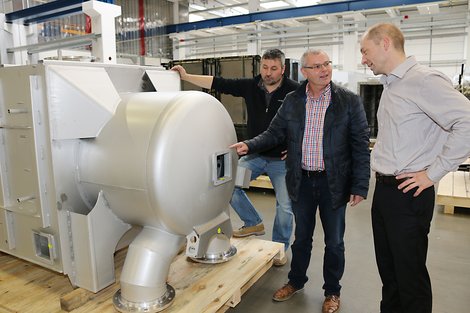Quality in a twin pack: Made in Switzerland and Germany

Hug Engineering and ElringKlinger in Saxony-Anhalt are partners in the production of soot filters
A Swiss watch's precision and Made in Germany quality are legendary and therefore reliable components for successful German/Swiss entrepreneurship, as practice shows in the German federal state of Saxony-Anhalt.
Uwe Schmidt is the Managing Director of Hug Engineering GmbH in Magdeburg. His company sells soot particle filters and exhaust gas purifiers throughout Germany. Customers are advised and supported by him and his staff both during the construction phase as well as during installation and with the maintenance of filter systems. Its major customers include Deutsche Bahn, the track construction machinery manufacturer Robel in Freilassing, shipyards in Bremen and the MTU (Motoren- und Turbinen-Union) Friedrichshafen. The filters and SCR systems to reduce nitrogen oxide are delivered to customers in metal casings from the Harz. That is why ElringKlinger AG in Thale is a regular destination for Uwe Schmidt. Its Plant Manager Matthias Karls and Production Manager Sven Dube are in constant contact with their business partner from Magdeburg. However, their relationship is also a "family tie". Both companies belong to the ElringKlinger Group in Swabian Dettingen.
"We are the strange foreigners", says Hug Engineering Managing Director. "Exhaust gas purifiers for large engines were not actually part of ElringKlinger corporate group's business activity. It develops and produces engine components for the car industry." Then, he tells us, there was the company decision to establish a presence outside the automotive industry. With Hug Engineering AG exhaust gas purifying for large diesel engines was added to the portfolio in 2011.
Hug Engineering's parent company is at home in Elsau, Switzerland, it was founded there 32 years ago by Thomas Hug. The company has expertise in the fields of diesel particle filters and catalytic exhaust gas treatment. And therefore it fits perfectly into ElringKlinger's corporate culture, as the company has dedicated itself to the principle of sustainability, conservation of resources and environmental protection.
"The filter systems from Hug", says Uwe Schmidt, "hold back soot particles in a dangerous range of 20 to 300 nanometres and give the user the assurance that they are using the best environmental technologies for diesel engines." There's more though: the SCR oxidation catalytic converters eliminate hydrocarbons, carbon monoxide and nitrogen oxide. "The emissions from gas engines are purified to such an extent that, for example, greenhouses can be supplied with CO2", explains the expert.
58-year old Uwe Schmidt started conquering eastern Germany as a market for the company 16 years ago. The mechanical engineer from one of the largest heavy machinery plants in the GDR is an expert in his field. He brought other experts as sales staff to the company, which built on the experiences in the mechanical engineering region of Magdeburg with Hug Engineering GmbH settling in Saxony-Anhalt's regional capital in 1999.
A generation shift is now looming, says Managing Director Schmidt and that all specialist staff, mechanical engineers, electricians, mechatronics, still come from the region. They are highly motivated and flexible as far as working all over Germany on building sites is concerned too.
ElringKlinger's Plant Manager Matthias Karls (39) in Thale can confirm the same for his staff. It is made up of the metal construction occupations. The economy in Harz has been shaped by metallurgy for centuries. The plant that ElringKlinger took over in 2013 has been processing metal since 1948. Production Manager Sven Dube (39) has experienced the thrilling development since German reunification. The product range extended from metal hospital beds to cigarette machines. Grinning, Dube points out the imminent separation of these two business areas.
In Switzerland, says Karls, we appreciate the expertise that is at home here combined with modern training and knowledge from national universities and research institutes. Matthias Karls comes from Bernburg in Saxony-Anhalt and studied mechanical engineering in Dresden. He regards the fact that he and his people come from the region as a positive factor for the location. Another one is its location with good links to all important motorways. "The pre-installed filter systems are transported from our premises by road to customers", says the ElringKlinger's Plant Manager adding that the distances from Saxony-Anhalt in all directions to customers is pretty much the same.
Lasering, punching and welding are done in both plant halls in Thale. They have just invested in a state-of-the-art laser punching machine and a round bending machine. Many production steps run automatically but not all of them. "We do not produce the casings in series but specifically for customers", emphasises Production Manager Dube. Whether it's on a fishing boat or cruise liner, in an HGV, construction machine or large power plant, there is never a lot of space planned for the filter so the casing constructors have to find customised solutions.
Uwe Schmidt nods knowingly. It's his job beforehand to communicate the customer's needs to the construction design and development departments in Switzerland both for the casing and the components inside. The filter elements are then made in Switzerland and delivered to Thale.
There are three casings in front of him; all the filter components are integrated into them. These here are intended for ship engines. Uwe Schmidt will now scrutinise these closely, starting with the weld seams. "They have to withstand high pressure", he says.
